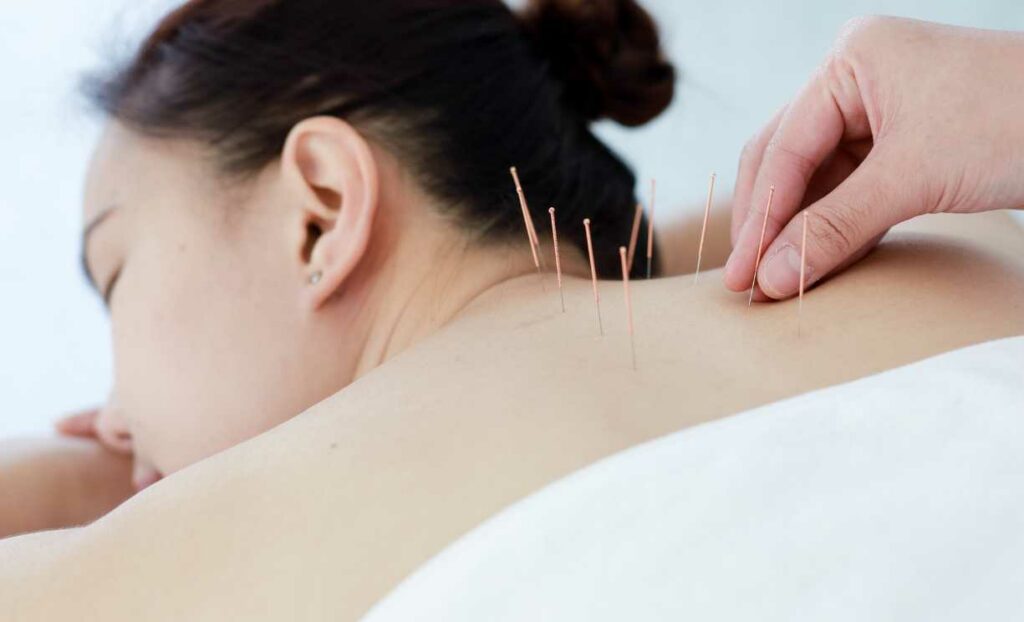As women enter the phase of menopause, the transformative journey comes with its share of challenges, and one particularly notorious companion is the dreaded hot flash. These sudden waves of intense heat, often accompanied by sweating and palpitations, can disrupt daily life and impact overall well-being. While various approaches exist to manage this common menopausal symptom, an ancient healing practice has been gaining attention for its potential to provide relief – acupuncture. In this blog, we’ll delve into acupuncture, how it works, and how it can help manage hot flashes during menopause.
Contents
Why Does Menopause Cause Hot Flashes?
Menopause causes hot flashes primarily due to changes in hormone levels, particularly a decline in estrogen. Estrogen plays a crucial role in regulating body temperature, and as its levels drop during menopause, the body’s cooling system becomes more sensitive. The brain’s thermostat, known as the hypothalamus, reacts to these hormonal shifts by triggering sudden increases in blood flow to the skin. This dilation of blood vessels leads to a feeling of intense heat and redness, characteristic of hot flashes.
Additionally, changes in neurotransmitters like serotonin, influenced by estrogen, further contribute to the onset of these sudden waves of warmth. While not all women experience hot flashes during menopause, these hormonal fluctuations can result in vasomotor instability, making blood vessels more prone to dilation, ultimately causing the phenomenon of hot flashes that many women associate with this life stage.
How Does Acupuncture Help With Hot Flashes?
Acupuncture can help alleviate hot flashes during menopause through a combination of physiological and energetic mechanisms. While the exact mechanisms are not fully understood, several theories and research findings suggest how acupuncture may work.
- Hormonal Regulation: Acupuncture is believed to influence the release of hormones, including endorphins and serotonin. These hormones play roles in pain relief, mood regulation, and overall well-being. By modulating hormonal levels, acupuncture may contribute to a more balanced hormonal environment reducing hot flashes.
- Regulating the Hypothalamus: The hypothalamus, a region of the brain involved in temperature regulation, may play a role in the onset of hot flashes. Acupuncture can also help modulate the function of the hypothalamus, making it less sensitive to slight temperature changes. This modulation can contribute to a reduction in the frequency and severity of hot flashes.
- Stress Reduction: Acupuncture has stress-reducing effects, and stress is known to be a trigger for hot flashes in some women. By promoting relaxation and reducing stress levels, acupuncture may indirectly contribute to the management of hot flashes.
- Placebo Effect: The placebo effect, where the belief in the effectiveness of a treatment contributes to its success, can play a role in acupuncture’s perceived benefits. Positive expectations and the therapeutic relationship between the acupuncturist and the patient may enhance the overall effectiveness of the treatment.
Acupuncture offers several potential benefits for women experiencing menopause, providing a holistic and natural approach to managing symptoms. Here are some of the benefits of acupuncture for menopause:
- Improved Sleep Quality: Many women going through menopause struggle with sleep disturbances, often linked to night sweats and hormonal fluctuations. Acupuncture may promote better sleep by addressing these underlying issues, allowing for more restful and uninterrupted sleep.
- Reduced Anxiety: Menopause can be a challenging time emotionally, and acupuncture may help reduce anxiety and stress. By promoting relaxation and affecting neurotransmitters like serotonin, acupuncture can positively impact mood and emotional well-being.
- Enhanced Energy Levels: Acupuncture may improve overall energy levels and combat fatigue, which is a common complaint during menopause. By stimulating specific acupoints, the treatment aims to boost vital energy (Qi) and alleviate feelings of exhaustion.
- Cognitive Function Support: Some women experience cognitive changes during menopause, often referred to as “brain fog.” Acupuncture may contribute to cognitive function support by addressing factors like sleep quality, stress, and hormonal balance.
- Improved Quality of Life: By addressing a range of physical and emotional symptoms associated with menopause, acupuncture can contribute to an overall improvement in the quality of life. Women may experience a sense of well-being and better adaptability to the changes occurring during this life stage.
- Non-Pharmacological Approach: Acupuncture offers a non-pharmacological and natural approach to managing menopausal symptoms. This can be particularly appealing for women seeking alternatives to hormone replacement therapy or other medications.
Conclusion
In conclusion, the exploration of acupuncture as a potential relief for hot flashes during menopause unveils a holistic approach deeply rooted in ancient wisdom. While the exact mechanisms are still unfolding, the anecdotal evidence and some research suggest that acupuncture holds promise as a complementary therapy for women navigating the challenges of menopause.
As women embark on their menopausal journey, the integration of acupuncture into their wellness strategy holds the potential to bring about a sense of balance, relief, and improved overall well-being.




